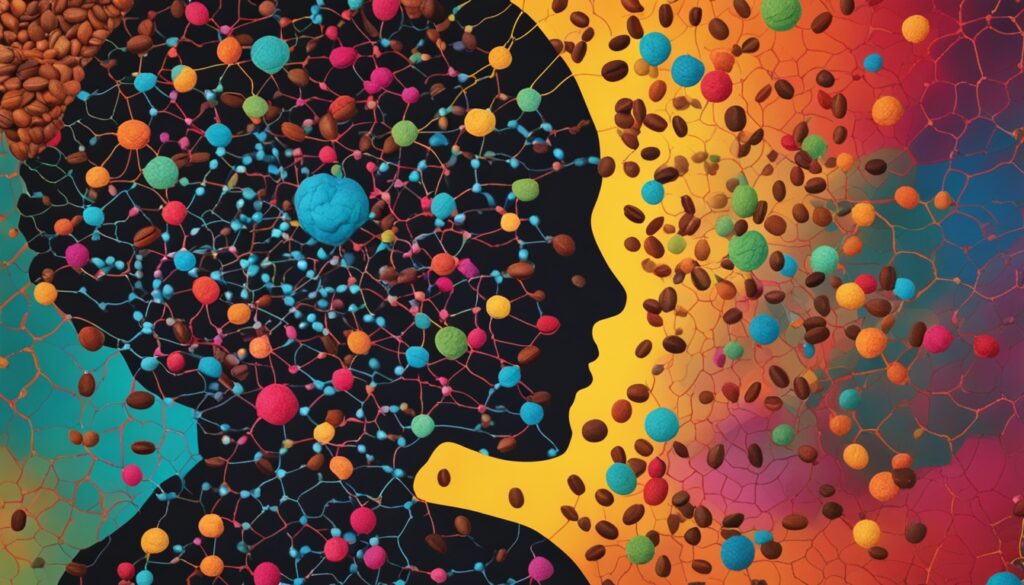Do you grab a cup of coffee every morning to wake up? You’re part of a big group coffee is loved all over the world.
But your daily coffee might do more than just wake you up. Studies are showing that coffee could have many health benefits. These benefits include lowering the risk of serious diseases and boosting your physical and mental skills.
Key Takeaways
- Coffee is linked to a lower risk of chronic health conditions like type 2 diabetes, heart disease, stroke, and certain cancers.
- Caffeine in coffee can enhance energy, endurance, and mental focus, making it a valuable tool for athletic performance and productivity.
- Regular coffee consumption may support brain health and protect against neurodegenerative diseases like Alzheimer’s and Parkinson’s.
- Moderate coffee intake, around 3-4 cups per day, is generally considered safe and healthy for most adults.
- The antioxidants and other beneficial compounds in coffee may offer protective effects for the liver and heart.
Boosts Energy and Combats Fatigue
Coffee’s secret to fighting fatigue is its main ingredient caffeine. This natural stimulant gives you an energy boost and fights tiredness all day.
Coffee’s Caffeine A Natural Stimulant
Caffeine is a stimulant for the central nervous system. It blocks adenosine receptors. This increases dopamine levels which helps with energy and mood. Studies show caffeine helps you last longer during exercise and lessens fatigue.
In the U.S. over 90% of adults drink caffeine daily, with an average of more than 200 milligrams a day. The FDA suggests no more than 400 milligrams a day. That’s like drinking four cups of coffee.
Increased Endurance and Reduced Perceived Exertion
- Caffeine boosts endurance during exercise, helping you go further.
- It also makes exercise feel easier by reducing perceived exertion.
Coffee gives you a natural morning energy boost and fights caffeine health advantages. It’s great for fighting fatigue and keeping your brain stimulant up all day.

May Reduce Risk of Type 2 Diabetes
Studies show that drinking coffee regularly might lower the chance of getting type 2 diabetes. This is because coffee helps keep the pancreatic beta cells working right. These cells make insulin to control blood sugar.
Preserving Pancreatic Beta Cell Function
Drinking one more cup of coffee daily could lower the risk of type 2 diabetes by 4 to 6%. This is thanks to coffee’s antioxidants and other compounds. They protect the pancreatic beta cells and help them make insulin.
Antioxidants and Improved Insulin Sensitivity
Coffee is full of antioxidants. Drinking it can lower inflammation and increase anti-inflammatory substances in the body. This might help prevent type 2 diabetes.
Health benefits from coffee are bigger for those who never or used to smoke. This shows the need for a healthy lifestyle with coffee to fight type 2 diabetes.
Overall, adding coffee to a healthy diet and active life might lower type 2 diabetes risk. But it’s important to choose the right type of coffee. Filtered or espresso coffee seems to offer the most benefits.
Supports Brain Health and Cognitive Function
Drinking a cup of coffee in the morning might do more than give you a boost of energy. It could also help your brain stay healthy and work better. Studies show that coffee and caffeine can make our minds sharper.
Caffeine, found in coffee, helps the brain by releasing neurotransmitters like dopamine, noradrenaline and serotonin. This can make you feel happier more alert, and improve your learning and quick thinking.
When used in moderation coffee may also protect against brain decline and diseases like Alzheimer’s and Parkinson’s.
Studies have found that drinking coffee regularly can lower the risk of Alzheimer’s disease by up to 65%. Coffee drinkers also have a 29% lower risk of getting Parkinson’s disease. The most benefits are seen in those who drink three cups a day.
| Cognitive Benefit | Relevant Research |
|---|---|
| Reduced risk of Alzheimer’s disease | Up to 65% lower risk with regular, moderate coffee consumption |
| Reduced risk of Parkinson’s disease | 29% lower risk in people who drank 3 cups of coffee per day |
| Improved short-term cognitive function | Caffeine promotes the release of neurotransmitters, enhancing mood, vigilance, learning, and reaction time |
The exact way coffee helps brain health and function is still being studied. But the early signs are promising. So go ahead and enjoy that next cup of coffee, knowing it might be good for your brain.

Promotes Weight Management and Physical Activity
Coffee might help with weight management. Studies show that drinking more coffee can lead to less body fat, especially in men.
For example drinking coffee benefits was linked to losing 0.12 kilograms kg of body weight over 4 years. On the other hand adding one teaspoon of sugar daily was linked to gaining 0.09 kg of weight in the same period.
It’s best to drink coffee in moderation, aiming for 3-4 cups or about 400 mg of caffeine a day. Avoid adding sugar, as it can cancel out the weight loss benefits of coffee and weight loss.
Coffee might also make people more active. Research shows that regular coffee drinkers tend to exercise more. This could help with weight management, as exercise is key to a healthy lifestyle.
| Metric | Impact on Weight |
|---|---|
| 1 cup of coffee daily | 0.12 kg weight loss over 4 years |
| 1 teaspoon of sugar daily | 0.09 kg weight gain over 4 years |
| Recommended coffee intake | 3-4 cups or 400 mg caffeine per day |

In conclusion, coffee benefits may help with weight management. It could help control fat storage and support physical activity. But, it’s crucial to drink coffee in moderation and skip sugar. Sugar can undo these weight-related benefits.
Reasons Why a Cup of Coffee Is Good for You
Coffee is more than just a morning pick-me-up. It’s full of antioxidants that can boost your health. Drinking it in moderation can help with energy, brain function, weight management, and even longevity.
Boosts Energy and Combats Fatigue
Coffee’s caffeine gives you a quick energy boost for the day. An eight-ounce cup also has vitamins and minerals like B vitamins and potassium. These help keep your energy up.
Supports Brain Health and Cognitive Function
Drinking coffee can lower the risk of Alzheimer’s and Parkinson’s diseases. It also improves brain function and focus. This makes it a great way to keep your mind sharp.
Promotes Weight Management and Physical Activity
Coffee can help with weight management by boosting metabolism and increasing activity. Studies show it’s linked to a lower risk of type 2 diabetes. This is because it helps prevent weight gain and obesity.
Provides Protection Against Chronic Diseases
Coffee is good for your heart, liver, and can even lower cancer risk. Drinking it regularly can reduce the risk of heart disease, liver cirrhosis, and some cancers. This makes it a great addition to a healthy lifestyle.
Drinking 3-4 cups of coffee a day can be good for you. But watch out for too much caffeine, as it can be bad. Always talk to a doctor before making any big changes to your diet.
| Health Benefit | Research Findings |
|---|---|
| Reduced Risk of Heart Failure | Studies indicate that drinking one to two cups of coffee daily may lower the risk of heart failure. |
| Lower Risk of Depression and Suicide | Coffee consumption has been linked to a lower risk of depression, with some findings indicating a 20% reduced risk of becoming depressed. People who drink four or more cups of coffee a day are 53% less likely to die by suicide. |
| Improved Liver Health | Both regular and decaffeinated coffee have been associated with healthier liver enzyme levels, and coffee drinkers have a significantly lower risk of liver cirrhosis and liver cancer. |
| Increased Longevity | Research involving over 400,000 people found that coffee consumption over 12 to 13 years was linked to a lower risk of death, with the strongest effect observed at four to five cups per day. |
Coffee has been shown to provide positive effects on liver health, protecting against liver cirrhosis in people at risk, such as those with alcohol use disorder or fatty liver disease.
Potential Protection Against Liver Diseases
Coffee isn’t just a morning boost; it could also protect your liver. Studies show that drinking two or more cups a day might keep liver diseases at bay.
Lower Rates of Liver Scarring and Cancer
Drinking coffee regularly is linked to less liver scarring, or cirrhosis. Two cups a day can cut cirrhosis risk by 44%. Four cups a day can lower it by 65%. Coffee may also slow liver cancer cell growth.
Decreased Risk of Chronic Liver Disease Mortality
Coffee’s benefits don’t end there. Drinking 1 to 3 cups a day can lower the risk of dying from chronic liver disease. Antioxidants in coffee help fight liver conditions like fibrosis and hepatitis B and C.
These coffee benefits work across brewing types, for both men and women. The effects are consistent whether it’s filtered, instant, or espresso.
Coffee is considered a potential important tool in battling liver disease due to its accessibility and relatively low cost, while doctors are yet to establish specific recommended amounts due to varied effects on different individuals.
While the research looks good remember, a healthy lifestyle is key. This includes eating well, drinking less alcohol, staying active, and getting vaccinated against hepatitis A and B.

Heart Health Benefits
Drinking coffee can be good for your heart. Studies show that having 2-3 cups of coffee per day can lower the risk of heart disease by 15%. Drinking 3-4 cups daily might even cut the risk of stroke by 21%. Plus, more coffee can mean a lower risk of heart failure.
Coffee is packed with over 100 active compounds. These can lessen oxidative stress, make insulin work better speed up metabolism, and stop abnormal heart rhythms. But, if you have high blood pressure, you might need to watch how much caffeine you drink to avoid problems.
Reduced Risk of Heart Disease and Stroke
Studies say moderate coffee consumption, 3-5 cups a day, can lower the risk of heart disease by 15%. Drinking 3-4 cups daily can also cut the risk of stroke by 21%. These benefits come from how coffee helps with heart health.
Decreased Risk of Heart Failure
For those who love coffee, the news is even better for heart failure. More coffee intake means a lower risk of heart failure. This is thanks to coffee’s effects on the heart like reducing inflammation and stress.
While coffee is good for the heart, it’s important to be careful if you have high blood pressure. Always talk to a doctor before changing your diet to make sure it’s right for you.
| Metric | Impact |
|---|---|
| Reduced Risk of Heart Disease | 15% reduction with 3-5 cups per day |
| Reduced Risk of Stroke | 21% reduction with 3-4 cups per day |
| Decreased Risk of Heart Failure | Significant reduction with increased coffee intake |

Drinking coffee in moderation as part of an overall healthy lifestyle can be a great way to support your heart health.
May Increase Longevity
Research is showing that drinking a cup of coffee every day could lead to a longer, healthier life. Studies have found that those who drink coffee regularly have a lower risk of death. This is true even when considering factors like age weight and alcohol use.
Associated with Lower Risk of Death
A big study with over 400,000 people aged 50-71 showed interesting results. Drinking 4-5 cups of coffee daily was linked to a 12% lower risk of early death for men and 16% for women. Even just one cup a day was found to cut the risk of dying early by 5-6%.
Potential Life-Extending Properties
Coffee’s benefits for longevity go beyond just that. It’s been found to reduce the risk of dying from infections, injuries, and many other diseases. The antioxidants in coffee may help protect against Alzheimer’s, Parkinson’s, type 2 diabetes, and liver diseases.
Drinking two to three cups of coffee per day was associated with a 14% lower likelihood of death for decaffeinated coffee, 27% for ground coffee, and 11% for instant coffee compared to no coffee consumption.
While we need more studies, the current evidence links coffee and longevity closely. Adding a few cups of coffee to your daily routine could be a simple way to live longer. It also offers caffeine health advantages.
Enhances Athletic Performance
Caffeine, found in coffee, is a natural stimulant. It gives you a morning energy boost and helps with athletic performance. Studies show that drinking caffeine before exercise can make you last longer and feel less tired. This leads to better results in sports.
Research says moderate caffeine, 3 to 6 milligrams per kilogram of body weight, can help with power and speed. This is true for sports like cycling, running, and skiing. Caffeine helps by releasing epinephrine. This affects muscle strength, heart rate, and energy levels.
For endurance sports, caffeine really helps. It can make you 2-4% better on average. Athletes use it to get ahead in competitions. But, too much caffeine, about 600 milligrams, can cause bad side effects without helping performance.
| Caffeine Dose | Effect on Performance |
|---|---|
| 1.4-2.7 mg/lb (3-6 mg/kg) of body weight | Modest improvements in endurance and power output |
| 200 mg | Improved performance for trained cyclists over 100 mg |
| 600 mg | Unpleasant side effects without additional benefits |
In conclusion, coffee’s caffeine can be a big help for athletes. It boosts morning energy and improves performance. By using caffeine wisely, athletes can enjoy its benefits without the downsides.
Reduced Risk of Depression and Suicide
Studies show that coffee has amazing benefits for mental health. Drinking coffee benefits by cutting down the risk of depression by 8%. Those who drink four cups a day are much less likely to feel depressed than those with just one cup.
Caffeine health effects also play a big role. Drinking coffee is linked to a lower risk of suicide. A study found that adults drinking two to four cups a day had half the suicide risk of others.
Drinking several cups of coffee daily reduces the risk of suicide in men and women by about 50%.
The best amount of coffee or caffeine is 2-3 cups a day, or 400 mg of caffeine. Drinking more doesn’t add much more benefit. There’s no big difference in risk between two to three cups and four or more cups a day.
Coffee could be a key part of fighting depression and suicide. It’s a simple way to boost mental health. Always talk to a doctor before making any big changes to your health routine.
Potential Protection Against Neurodegenerative Diseases
Research shows that drinking coffee every day might protect against serious brain diseases like Alzheimer’s and Parkinson’s. Studies suggest that caffeine in coffee can lower the risk of these diseases. It can also slow down the loss of brain function in older people.
Lower Risk of Alzheimer’s and Parkinson’s
Many studies have found that drinking more coffee can reduce the risk of Parkinson’s disease. Caffeine seems to protect the brain more in Parkinson’s than in Alzheimer’s. Also, moderate coffee drinking is linked to a lower risk of Alzheimer’s disease, which is the most common dementia type.
Slowing Cognitive Decline
Coffee isn’t just good for fighting brain diseases; it also helps older adults keep their minds sharp. Long-term studies like the “Three City Study” and the FINE study show that drinking coffee is linked to a lower risk of dementia or cognitive decline.
Coffee’s benefits for the brain might come from its antioxidants and compounds like phenylindanes, formed during roasting. These substances can stop harmful proteins from gathering in the brain. This could slow down brain diseases.
Caffeine has been observed to modulate vesicle release and recovery at cerebellar parallel fibre terminals independent of calcium and cyclic AMP signaling, showcasing its neuroprotective potential.
Enjoying a cup of coffee can be good for your brain health, not just a way to wake up. Coffee and its compounds could be key in fighting against brain decline and diseases.
Conclusion
Coffee is a beloved drink that brings joy and flavor to millions. It’s packed with health benefits that make it great for a healthy lifestyle. It gives you a morning energy boost and helps your brain work better. Plus, it can help with weight management and lower the risk of chronic diseases.
Drinking 3-4 cups of coffee per day is the sweet spot. It lets you enjoy the good stuff about caffeine without the bad. Whether you like the smooth taste of Arabica or the strong flavor of Robusta, there’s a coffee for everyone.
When you drink your daily coffee, remember you’re doing more than just enjoying a tasty drink. You’re also giving your body and mind a boost. So, let coffee be your daily health boost. It’s a way to keep your body, mind, and life full of energy and joy.





